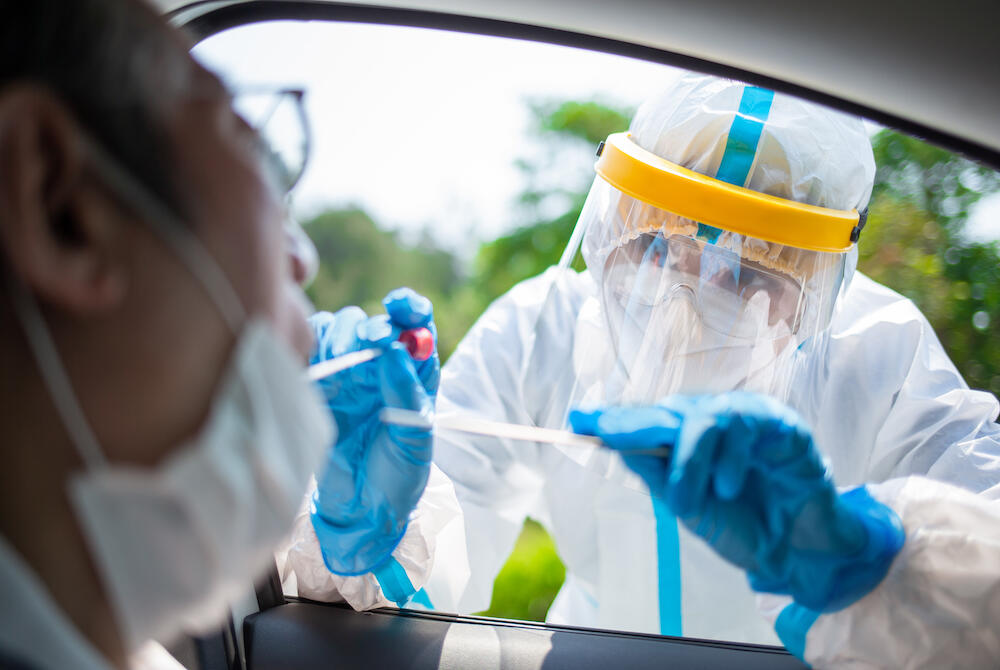
Sept. 1, 2020
Students’ plan for at-home COVID-19 testing kit recognized by Clinton Foundation
Share this story
A team of Virginia Commonwealth University students is trying to develop an at-home COVID-19 testing kit, and the work has attracted the attention of the Clinton Foundation.
In the spring, Anubhav Thapaliya, Lyndsey Highlander, Sivam Bhatt, Teerth Patel and Nuhash Bhuiyan participated in a health care sprint focused on COVID-19 through the VCU da Vinci Center for Innovation. Highlander will graduate in December from the School of Nursing. Her teammates are all sophomores and members of the Honors College, and are studying biology in the College of Humanities and Sciences.
“The four of them knew each other, and I signed up last minute, because I wanted to do something different than stare at a screen all day,” Highlander said. “Everything had been online at that point. One of the team leaders for da Vinci threw me into their team.”
The group began discussing issues around the pandemic and realized that a limited supply of personal protective equipment such as masks and gowns existed. The team also learned about the highly contagious nature of the virus, which led them to look at home testing as a way to protect health care workers and preserve personal protective equipment.

Testing normally takes place two ways. A person can go to a drive-up testing center or an urgent care facility. Thapaliya said in each case the health care worker is placed at risk and valuable equipment is being used. The VCU team concluded that in-home testing could solve both problems.
“Our premise was that it is safer to get tested at home,” Thapaliya said. “It’s an at-home testing alternative.”
The team originally envisioned a phone app but later the idea grew into an at-home testing kit built around the app. A person would sign up for a test, which would be shipped to their home. The test kit would then be mailed back, and the results would be made available on the app.
“I like to think of it as the Amazon of COVID-19,” Highlander said. “You order it online. It comes to your front door, and then you can send it back from your front door. It’s as simple as it needs to be for people to get the results they need to have peace of mind.”
Their project, Safe At Home, was well-received at the da Vinci event and received the People’s Choice Award, which included a $500 stipend. The team decided to submit the idea as a candidate for the Clinton Global Initiative University’s COVID-19 Student Action Fund, which was started in April to support students at universities around the world who are committed to addressing the COVID-19 pandemic. The program received more than 1,400 applications, and the VCU team was one of 38 to be recognized.
“It took a lot of communication, cooperation to come up with a final product and get to the stage where we are at right now,” Bhuiyan said.
The goal of the action fund is to help projects receive funding. The Clinton Foundation helped the team set up a GoFundMe page, and the students are talking with VCU about ways to move the project forward.
“The Clinton Foundation becomes a platform for you to market the idea,” Thapaliya said.
The Safe at Home team wants to develop a pilot program through the university. Members of the team are talking with VCU Laboratory Services about using its testing kit. The pilot would involve sending the kits to 20 people and then analyzing the testing data. The goal is to eventually have a working model in Richmond that could be replicated across the state and throughout the country.
“I want to link arms with VCU and have them approve us and make an actual kit that we can put in our hands and see if it makes people feel more safe to do this in their home,” Highlander said.
However, to make the project a reality the team must overcome several obstacles. The first is logistics. How would a test be sent to someone and how would it be sent back to the lab? The team has had some discussions with a local courier service but nothing has been finalized. The other problem is privacy. The app would have to meet government privacy requirements, and that could take months.
Still, the students believe in the idea and want to find a way to make it a reality. They said they have enjoyed the journey and the challenge of working together. Much of the work was done through Zoom, so the collaborative process was very different than if they had met in person.
“We really had to figure out how to divide up the work and then find a way to meet later and discuss everything,” Bhatt said.
Patel agreed.
“It took a lot of communication [and] cooperation to come up with a final product and get to the stage where we are at right now.”
Subscribe to VCU News
Subscribe to VCU News at newsletter.vcu.edu and receive a selection of stories, videos, photos, news clips and event listings in your inbox.







